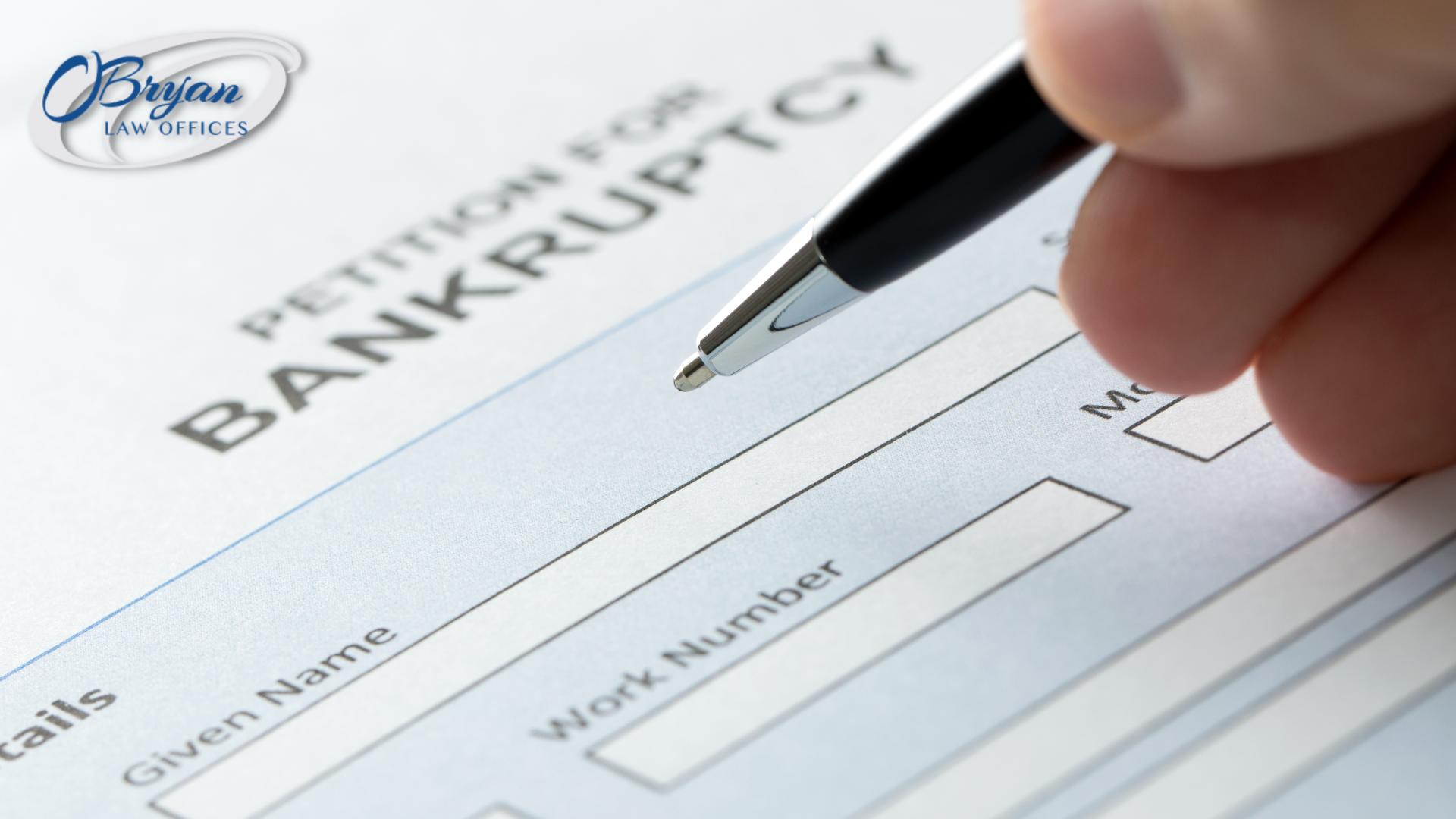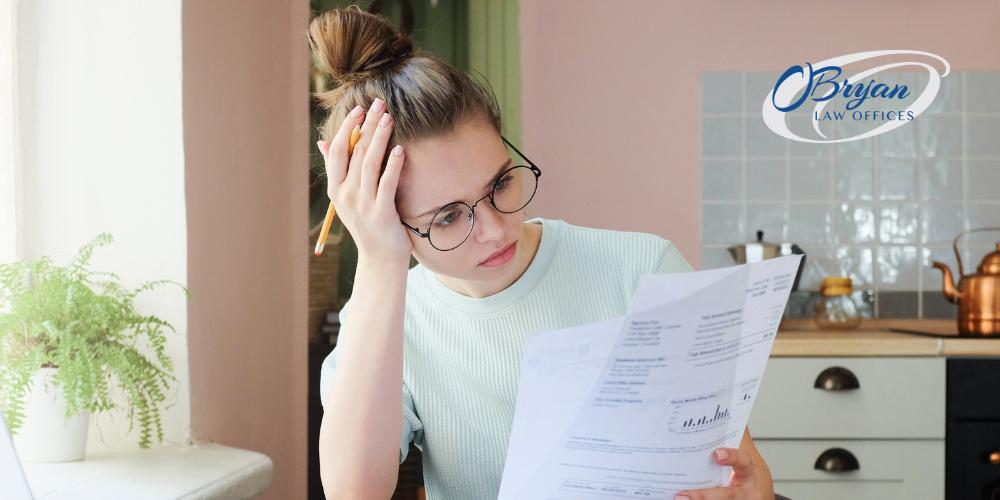Are you drowning in debt with no clear path forward? Filing for bankruptcy in Kentucky might be an option worth considering. Bankruptcy is a legal process that can provide relief from overwhelming financial burdens when you’ve exhausted all other options.
The pros of filing for bankruptcy include:
- Immediate Relief from Creditor Harassment
- Elimination of Unsecured Debt
- Protection of Essential Assets
- Fresh Financial Start
The cons of filing for bankruptcy include:
- Impact on Credit Score
- Potential Loss of Property
- Public Record
- Not All Debts Are Dischargeable
- Filing Costs and Fees
Many Kentuckians face difficult financial situations due to medical bills, job loss, divorce, or other unexpected life events. Without action, these debts can lead to wage garnishment, foreclosure, repossession, and relentless creditor harassment that disrupts your daily life.
Our Louisville bankruptcy lawyer will provide personalized guidance to help you determine if bankruptcy is the right choice for your situation.
What are some potential positive outcomes of filing for bankruptcy?
Immediate Relief from Creditor Harassment
Filing for bankruptcy triggers an automatic stay that immediately stops most collection actions. This means creditors must cease calling, sending letters, or pursuing lawsuits against you.
This protection gives you breathing room to assess your financial situation without constant pressure from debt collectors.
Elimination of Unsecured Debt
Most unsecured debt can be discharged through bankruptcy, including credit card debt, personal loans, and medical bills. This allows you to move forward without the burden of these financial obligations.
Credit card bills that have been piling up for months or years can be eliminated, giving you a fresh financial slate.
Protection of Essential Assets
Through Kentucky’s bankruptcy exemptions, you can often keep essential assets like your home, car, and retirement accounts. The law is designed to help you maintain a basic standard of living while addressing your debt issues.
Kentucky offers specific protections that allow most filers to keep their primary residence and vehicle.
Fresh Financial Start
💡 Fresh Start Opportunity: Bankruptcy isn’t the end—it’s a legal reset button to rebuild your finances and take control of your future.
Bankruptcy provides an opportunity to rebuild your financial life on solid ground. After discharge, you can begin establishing new credit and developing healthier financial habits.
Hypothetical Scenario: Jane, a nurse from Louisville, accumulated over $75,000 in medical bills after an unexpected surgery and lengthy recovery. Despite working overtime, she couldn’t keep up with payments while managing her mortgage and basic living expenses. After filing Chapter 7 bankruptcy, her medical debt was discharged, allowing her to rebuild her finances without that overwhelming burden.
Additional reading: bankruptcy pros and cons

What is the downside of filing for bankruptcy?
Impact on Credit Score
Bankruptcy will remain on your credit report for seven to 10 years, depending on the type filed. Chapter 7 bankruptcy stays on your credit report for 10 years, while Chapter 13 remains for seven years.
This negative mark can make it difficult to obtain new credit, and when you do qualify, you may face higher interest rates.
Potential Loss of Property
In a Chapter 7 bankruptcy, non-exempt assets may be sold to pay your creditors. While Kentucky’s exemptions protect many necessities, luxury items or significant investments might be liquidated.
Property that exceeds exemption limits could be at risk during the bankruptcy process.
Public Record
Bankruptcy filings are public records that anyone can access. This may affect your privacy and potentially impact professional relationships or employment opportunities in certain fields.
Future employers or landlords may discover your bankruptcy during background checks.
Not All Debts Are Dischargeable
Some debts cannot be eliminated through bankruptcy, including most student loans, child support, alimony, recent tax debts, and court-ordered restitution payments.
Federal student loans typically remain your responsibility even after bankruptcy is completed.
Filing Costs and Fees
While designed to help those in financial distress, bankruptcy itself isn’t free. Filing fees, attorney costs, and mandatory credit counseling expenses can add up to several thousand dollars.
Hypothetical Scenario: Michael, a small business owner in Lexington, filed for Chapter 7 bankruptcy after his business failed. While his business debts were discharged, he was surprised to learn that his recent tax obligations and student loans remained. He still had to develop a repayment plan for these debts even after his bankruptcy case closed.
Our experienced attorneys will help you weigh the pros and cons and choose the best debt relief strategy for your future. Contact us for a free consultation.
Should I file for bankruptcy?
Filing for bankruptcy is a significant decision that depends on your specific financial situation. Consider these key factors when determining if bankruptcy is right for you:
First, assess the amount and types of debt you’re facing. If you’re overwhelmed by unsecured debt like credit cards or medical bills, bankruptcy may provide meaningful relief.
A thorough review of your debt-to-income ratio can help determine if you can reasonably repay your debt within three to five years.
Second, evaluate your current income and future earning potential. The bankruptcy means test will determine your eligibility for Chapter 7 or Chapter 13 bankruptcy based on your income level.
If you have a stable income but need debt restructuring, Chapter 13 might be more appropriate than Chapter 7. Consider whether you’re facing imminent foreclosure, repossession, lawsuit, or wage garnishment. Bankruptcy’s automatic stay can provide immediate protection in these situations.
| Feature | Chapter 7 | Chapter 13 |
|---|---|---|
| Timeline | 3–6 months | 3–5 years |
| Income Requirement | Means-tested | Regular income needed |
| Asset Protection | Some assets liquidated | Protects most property |
| Debt Types Discharged | Most unsecured | Structured repayment |
| Court Involvement | One appearance | Ongoing payments |
| Credit Impact | 10 years | 7 years |
For Kentucky residents, both the Eastern District Bankruptcy Court and Western District Bankruptcy Court provide resources for the filing process. Your location within the state will determine which court handles your case.
The Kentucky Legal Aid organization also offers guidance for low-income residents considering bankruptcy.
💡 Evaluate Based on Debt Type & Income: Not all debts qualify for discharge. Our experienced attorney will assess if bankruptcy matches your financial goals.

Is filing for bankruptcy a good idea?
Filing for bankruptcy may be a good idea when your debt has become unmanageable and you see no realistic path to repay your creditors. The decision should be based on your unique financial circumstances, the types of debt you have, and your long-term goals.
Bankruptcy can be particularly beneficial in certain situations, such as when medical bills have created insurmountable debt or when job loss has made it impossible to keep up with payments.
Timing is critical when considering bankruptcy. Filing too early might mean missing out on alternatives, while waiting too long could result in lost assets or continued financial damage.
Consider seeking advice from our bankruptcy attorney who will analyze your specific situation. They will help determine if bankruptcy is the right solution or if other debt relief options might be more appropriate.
Hypothetical Scenario: A retired couple in Frankfort faced foreclosure after falling behind on mortgage payments due to unexpected medical expenses. By filing Chapter 13 bankruptcy, they were able to stop the foreclosure process and develop a repayment plan that allowed them to keep their home while addressing their debts over five years.
Is filing for bankruptcy bad?
Bankruptcy isn’t inherently “bad” – it’s a legal tool designed to help people in financial distress get a fresh start. The U.S. bankruptcy code exists specifically to provide relief to honest debtors who cannot meet their financial obligations.
Many people worry about the stigma associated with bankruptcy, but financial hardship can happen to anyone. Economic downturns, medical emergencies, job loss, and other unexpected circumstances often lead to bankruptcy through no fault of the individual.
The idea that you’ll never get credit again after bankruptcy is a myth. While your credit score will initially drop, many people qualify for new credit cards within 1-2 years, and mortgage loans within 2-4 years of discharge.
Bankruptcy can actually be the responsible choice when debts have become unmanageable. It prevents further financial damage and allows you to rebuild on solid ground rather than continuing to struggle with payments you cannot afford.
According to data from the Administrative Office of the U.S. Courts, thousands of Kentuckians file for bankruptcy each year, demonstrating that it’s a common legal solution to financial distress.
Alternatives to filing for bankruptcy in Kentucky
Before committing to bankruptcy, consider these potential alternatives:
- Debt consolidation: Combine multiple debts into a single debt consolidation loan with a lower interest rate, making your payments more manageable.
- Credit counseling: Work with a nonprofit credit counselor from an organization like Kentucky Housing Corporation to develop a debt management plan and negotiate with creditors.
- Debt settlement pros and cons: This approach involves negotiating with creditors to pay less than what you owe as a lump sum payment, but it can significantly impact your credit report.
- Payment plans: Contact creditors directly to arrange more manageable repayment plans based on your current financial situation.
- Borrowing from family or friends: Consider asking trusted individuals for assistance with strict repayment terms, though this can strain relationships.
📌 Remember that many debt settlement companies charge high fees with no guarantee of success. Always research any company thoroughly and consider consulting with a nonprofit credit counseling agency first.
The Consumer Financial Protection Bureau offers resources to help you evaluate debt relief services and avoid scams.

What our Kentucky bankruptcy lawyers can do for you
Our bankruptcy attorneys bring decades of combined experience helping Kentuckians manage financial challenges. We understand the local bankruptcy courts, trustees, and Kentucky-specific exemption laws that can protect your assets.
When you work with our firm, we’ll provide:
- Comprehensive analysis of your financial situation to determine if bankruptcy is your best option
- Guidance on whether Chapter 7 or Chapter 13 bankruptcy is most appropriate for your circumstances
- Protection from creditor harassment through the automatic stay
- Maximization of Kentucky exemptions to protect your property
- Representation at all court appearances and meetings with creditors
Our attorneys have successfully helped clients from diverse backgrounds – from small business owners facing business debt to families struggling with medical bills and individuals dealing with job loss.
We understand that considering bankruptcy can be emotionally challenging. Our approach is judgment-free, focused on providing practical solutions to help you move forward.
Hypothetical Scenario: A single parent in Bowling Green was struggling with overwhelming debt after a divorce. The attorney from our firm not only helped them file Chapter 7 bankruptcy but also ensured they understood which debts would be discharged and which would remain. The attorney successfully protected their modest home through Kentucky’s homestead exemption, allowing them to maintain stability for their children while eliminating unsecured debt.
Our Bowling Green bankruptcy attorney will help you understand all your options and guide you through the bankruptcy process with compassion and expertise.
Key takeaways on the pros and cons of bankruptcies
Bankruptcy is a significant decision that offers both relief and challenges. The automatic stay provides immediate protection from creditors, while debt discharge offers a path to a fresh start. However, the impact on your credit report, potential asset loss, and certain non-dischargeable debts must be carefully considered.
Kentucky’s specific exemption laws often allow residents to protect essential assets like homes and vehicles during bankruptcy. Knowing the differences between Chapter 7 and Chapter 13 bankruptcy is essential for making the right choice for your situation.
Whether bankruptcy is right for you depends on your unique financial circumstances, the types of debt you’re facing, and your long-term goals. Professional guidance from our bankruptcy attorney will help you manage this complex decision with confidence.
FAQs
Can bankruptcy stop wage garnishment or lawsuits immediately?
Yes, filing for bankruptcy triggers an automatic stay that immediately stops most collection actions, including wage garnishment, lawsuits, foreclosures, and repossessions. This legal protection gives you breathing room while your bankruptcy case proceeds through the court system.
The automatic stay takes effect the moment your bankruptcy petition is filed with the court. Creditors must cease all collection activities or face penalties for violating the stay.
Will I lose everything if I file for bankruptcy in Kentucky?
No, Kentucky’s bankruptcy exemptions protect many essential assets. Most Chapter 7 filers keep all their property, and Chapter 13 allows you to retain assets while repaying a portion of debts.
Kentucky law provides specific exemptions for your home equity, vehicle, household goods, retirement accounts, and personal property. Our attorneys work to maximize these exemptions to protect your important assets.
How soon can I start rebuilding my credit after bankruptcy?
You can begin rebuilding your credit immediately after your bankruptcy case is closed. Many people see credit score improvements within 12-18 months by responsibly using secured credit cards and making timely payments on remaining debts.
Some lenders offer credit products specifically designed for those recovering from bankruptcy. With consistent positive credit behavior, many former bankruptcy filers qualify for major purchases like mortgages within 2-4 years.
What’s the difference between bankruptcy and debt consolidation?
Bankruptcy is a legal process that discharges qualifying debts or creates a court-supervised repayment plan, while debt consolidation combines multiple debts into a single loan with one monthly payment.
Bankruptcy offers legal protections and potential debt elimination but has longer-term credit consequences. Debt consolidation doesn’t eliminate debt but may lower overall interest rates without the same credit impact.
How can your lawyers help me decide if bankruptcy is right for me?
Our bankruptcy lawyers will thoroughly analyze your financial situation, including your debts, income, assets, and goals, to determine if bankruptcy is your best option or if alternatives might better serve your needs.
We’ll explain how Kentucky bankruptcy laws apply to your specific case, outline which debts can be discharged, and identify which assets can be protected. Our goal is to provide clear guidance so you can make an informed decision about your financial future.








